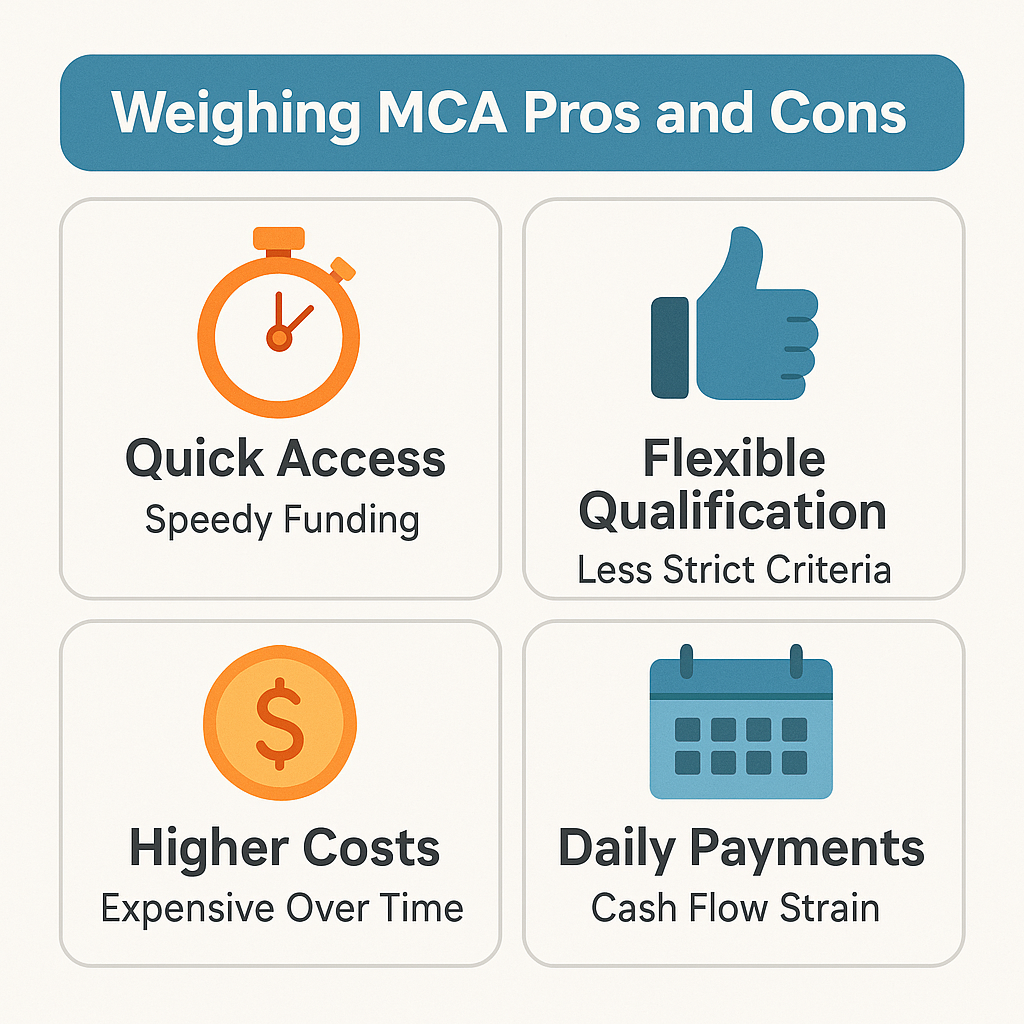Understanding Merchant Cash Advances: Weighing the Benefits and Drawbacks
When businesses need quick funding, merchant cash advances often come up as an option. But understanding the pros and cons of merchant cash advances can mean the difference between smart growth and financial strain. This funding method offers unique advantages like speed and flexibility, yet comes with distinct challenges that might not suit every business situation.
With recent regulatory changes affecting the MCA landscape, including new compliance requirements in various states, it's more important than ever to understand what you're getting into. Let's explore both sides of this funding option to help you make an informed decision.
Common Questions About MCA Benefits and Drawbacks
Q: What's the biggest advantage of choosing a merchant cash advance over traditional financing?
The speed and accessibility typically stand out as the primary benefits. MCAs often provide funding within days rather than weeks or months, and they don't require the extensive documentation or perfect credit scores that traditional financing might demand. This makes them particularly appealing for businesses that need immediate capital or have been turned down by banks.
Q: Are there hidden costs I should watch out for?
While not necessarily hidden, the total cost structure can be complex. Factor costs, daily payment amounts, and the impact on cash flow need careful consideration. Recent regulatory changes in some states are pushing for clearer disclosure requirements, which may help merchants better understand these costs upfront.
Key Advantages of Merchant Cash Advances

Merchant cash advances offer several compelling benefits that make them attractive to many business owners. Here are the primary advantages to consider:
- Quick Access to Capital: MCAs typically provide funding much faster than traditional financing options, often within 24-48 hours of approval. This speed can be crucial when business opportunities or urgent expenses arise.
- Flexible Qualification Requirements: Unlike traditional financing that heavily weighs credit scores, MCAs focus more on your business's daily sales volume. This makes them accessible to businesses with less-than-perfect credit histories.
- No Collateral Required: Most MCAs are unsecured, meaning you don't need to put up business assets or personal property as security for the advance.
- Payment Structure Aligns with Revenue: Since repayments are typically tied to a percentage of daily sales, payments naturally fluctuate with your business performance, providing some built-in flexibility during slower periods.
Primary Disadvantages and Risk Factors
While MCAs offer benefits, they also come with significant drawbacks that require careful consideration. Understanding these limitations helps you make a more balanced decision:
- Higher Overall Costs: MCAs typically carry higher factor rates compared to traditional financing interest rates, which can make them an expensive funding option over time.
- Daily Payment Impact: The daily or weekly payment structure can strain cash flow, especially during slower business periods when revenue dips but payments continue.
- Limited Regulatory Protection: MCAs often fall outside traditional lending regulations, which might mean fewer consumer protections compared to conventional financing options.
- Potential for Debt Cycles: The combination of high costs and daily payments can sometimes lead businesses to seek additional advances before paying off existing ones, creating a challenging cycle.
Business Suitability Assessment Criteria
Not every business is well-suited for merchant cash advances. Certain characteristics make some businesses better candidates than others:
- High Daily Transaction Volume: Businesses with consistent daily sales, like restaurants or retail stores, may handle the daily payment structure more effectively than businesses with irregular income patterns.
- Seasonal Revenue Patterns: Companies with predictable seasonal fluctuations might benefit from the revenue-based repayment structure, as payments adjust with sales volume during off-peak periods.
- Short-Term Capital Needs: MCAs work best for businesses needing quick capital for immediate opportunities or urgent expenses rather than long-term investment projects.
- Limited Traditional Financing Options: Businesses that struggle to qualify for conventional financing due to credit issues or lack of collateral might find MCAs more accessible.
Steps to Evaluate MCA Suitability for Your Business
Before committing to a merchant cash advance, follow these essential evaluation steps to determine if it aligns with your business needs:
- Calculate True Cost Impact: Work out the total amount you'll repay and compare it to other financing options. Consider how the factor rate translates to an annual percentage rate equivalent for better comparison.
- Analyze Cash Flow Capacity: Review your daily sales patterns to ensure you can handle the payment structure even during slower periods. Consider seasonal variations and potential market changes.
- Review State Regulations: Check current regulations in your state, as new compliance requirements in states like Texas may affect availability and terms of MCAs in your area.
- Explore Alternative Options: Compare MCAs with other financing alternatives, including traditional term loans, lines of credit, or equipment financing that might better suit your specific situation.
- Plan Your Repayment Strategy: Develop a clear plan for how the advance will generate enough additional revenue to justify the costs and ensure successful repayment without straining operations.
Growth Trade-offs and Long-term Considerations
When weighing merchant cash advances for business growth, it's important to consider the long-term implications beyond immediate capital access:
- Impact on Future Financing: Frequent use of MCAs might affect your ability to qualify for traditional financing later, as lenders may view heavy reliance on alternative funding as a risk factor.
- Cash Flow Management: The daily payment structure requires ongoing cash flow management skills and systems, which might demand more administrative attention than monthly loan payments.
- Growth Sustainability: Evaluate whether the business growth enabled by the advance will generate sufficient additional revenue to offset the higher costs and support sustainable expansion.
- Regulatory Environment Changes: Stay informed about evolving regulations that might affect MCA availability, costs, or terms in your state, as the regulatory landscape continues to develop.
The pros and cons of merchant cash advances create a complex decision matrix for business owners. While MCAs offer unmatched speed and accessibility for businesses needing quick capital, they come with higher costs and daily payment obligations that require careful consideration.
Your decision should ultimately depend on your specific business situation: cash flow patterns, growth objectives, and available alternatives. If you have consistent daily sales, need immediate funding, and can handle the payment structure, an MCA might provide the capital boost you need. However, if you have time to explore other options or your cash flow is unpredictable, traditional financing alternatives might serve you better.
As regulations continue to evolve and the alternative lending landscape changes, staying informed about your options remains crucial. Take time to thoroughly evaluate your needs, understand all costs involved, and consider how any financing decision fits into your broader business strategy.

.png)






